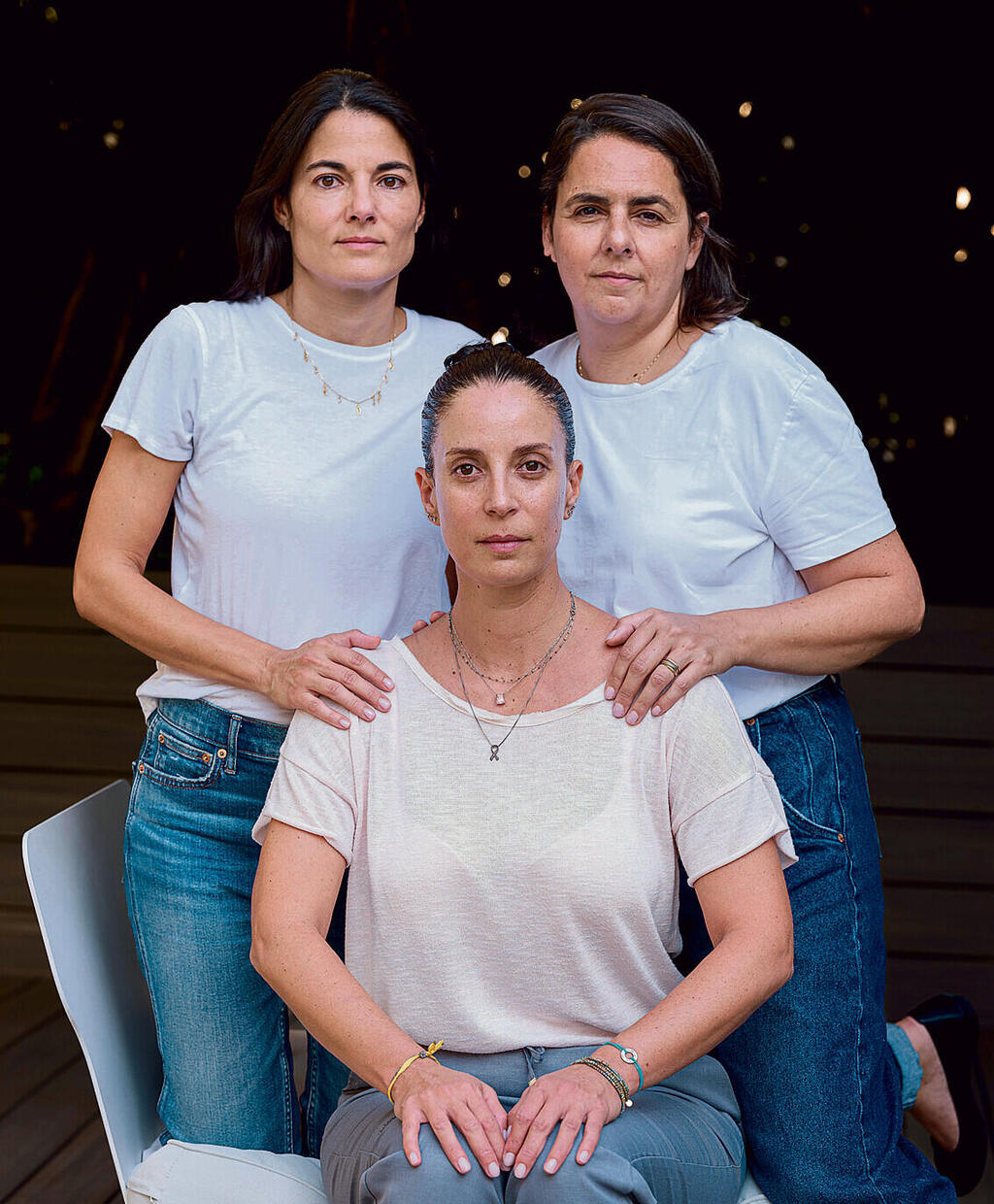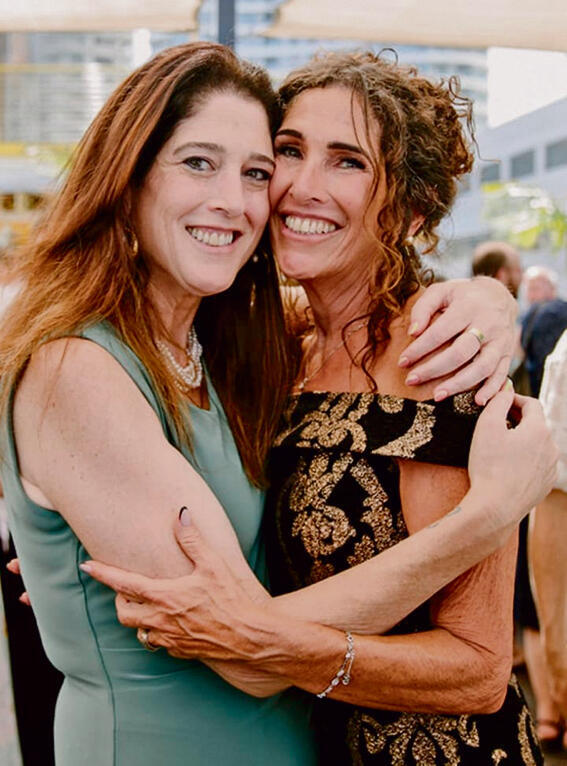Getting your Trinity Audio player ready...
Since October 7, hundreds of families have lost their loved ones to war and terror, leaving them grappling with immense grief and loss. Beyond the emotional and psychological support they need during this devastating time, these families are also seeking ways to honor and commemorate those they have lost.
Yael Hollander, Daphne Seroussi and Yael Ouanounou, founders of the Smile Foundation—a platform established to turn private gifts into opportunities for donations and community aid—have stepped up to help the bereaved families. “It’s natural that the urge to commemorate is arising only now,” they said.
The platform has been used to promote the music of spouses who were murdered in Kibbutz Holit on October 7 and to fund a rehabilitative trip in memory of a fallen soldier.
The Smile Foundation was founded in 2019 by Hollander under joyful circumstances: she was celebrating her 40th birthday, her husband’s 50th, her eldest son’s bar mitzvah and her father’s 80th birthday.
“It was a year filled with celebrations, but the subject of gifts irked me,” she recalls. “Another massage gift card? More scented candles? Giving is important to me. I’m a physical therapist at Beit Izzy Shapiro, and I was looking for a way to combine private celebrations with giving back to the community.”
After asking her friends to replace her birthday gifts with donations, Hollander recognized the need for an organized platform to connect private donors with the 40,000 non-profit organizations operating in Israel. “Yes, I was also shocked by the number,” admits Yael. “We all know the top 10 big organizations, which already receive large budgets, but there are thousands of smaller organizations doing amazing community work that remain in their shadow and don’t even have proper websites.”
With the help of her two friends, Daphne and Yael, she founded the Smile Foundation, which they describe as a “social BUYME” platform. To establish the foundation, each of the three friends contributed funds from their private savings (“a loan,” clarifies Yael, “with the hope that at some point in the future, we’ll be able to repay it”) to build the colorful app.
“I scoured the country and hand-picked 30 non-profit organizations working in various fields, from supporting abused women to assisting those leaving the ultra-Orthodox community. For each organization, I customized what a private donation could buy,” explains Yael. “If you donate 10 shekels, that buys three sandwiches for a child. At the Starting Over Farm, you can choose between rescuing a sheep or adopting a donkey. That way, everyone knows exactly where their money is going.”
However, the COVID-19 pandemic ground the foundation's operations to a halt. Despite the setback, Hollander used the forced lull to add crucial information about each organization featured on the Smile website, including Yad and Lev, which supports Holocaust survivors, and The Center for Training Service Dogs, which provides assistance to patients with PTSD. She also put together care packages at fixed prices, such as those including a cake, a flower pot and challah for Shabbat for 50 NIS.
Even the smallest donations have an impact. “A donation doesn’t have to replace a wedding gift; it can be a complementary gift for a new mother, or a way to thank the doctor who treated you. For that purpose, we’ve added a range of different notes to accompany each donation, because in my eyes, the note can often be more important than the gift itself. I’ve called this gifting option ‘a triple gift’ because there are three beneficiaries: the one who donates, the one on whose behalf the gift is given and the recipient.”
Rachel Shapira was moved
On the eve of Rosh Hashanah, the trio was working tirelessly, “but then October 7 happened, and everything collapsed. Who was in the headspace for gifts then? And who did you feel more obliged to help—the evacuees who had suddenly lost their homes or the already homeless people who had come to rely on your support?” Hollander recalls.
“I felt uncomfortable with the thought of evacuees from the north and south receiving second- or even third-hand clothing donations. With all due respect to those who opened their closets to donate, it still left a bitter taste in my mouth. I wanted to provide them with true independence. So we raised money to give evacuees vouchers. Each family received a BUYME gift voucher, which they could use in stores like Fox or at a baby clothing shop.
"I joined forces with Jewish communities abroad. A Jewish community in Cambridge adopted Kibbutz Nir Oz and financed the vouchers we provided for them. A community from Vancouver adopted Holit. Some organizations offered gifts to children, like Hanukkah presents, but I objected to that approach. We distributed vouchers so the children could choose their own pajamas or games. Receiving eight gifts in a row brings joy. It's a small smile.”
The prolonged war forced Hollander to come up with creative ideas. "At one of the rehabilitation centers, I selected five wounded soldiers and found a company that donates a voucher of one thousand shekels to each of them monthly, as well as to the families of reservists," she explains. “Tonight, one of our wounded soldiers is getting married, and I found someone who financed the wedding dress, a makeup artist and other goodies."
Now, almost a year since that fateful Sabbath, reality demands a new course of action. Bereaved families from the Nova festival massacre and the military are interested in establishing memorial exhibits in honor of their loved ones, and Hollander is determined to help.
"In my view, it's natural that the urge to memorialize is only now emerging," she says. "It took these families time to process, to build a new kind of routine for themselves, and to recover all their deceased loved ones. When families tell me they want to establish a memorial foundation, I explain that it is a process requiring financial resources, an accountant, a lawyer, and endless bureaucracy. It is not suitable for everyone."
As a result, the Smile app has opened a new page dedicated to memorializing. "I don't interfere with the content; I only manage negotiations with the various suppliers to optimize fundraising and reduce costs," Hollander explains.
Among the projects that have come to fruition is an album dedicated to the late Shahar and Shlomi Mathias, who were murdered on October 7 in the shelter of their home in Holit. "Shahar, my only sister, was a singer, and Shlomi, my brother-in-law, was the music teacher for all the children in the settlements around Gaza," says Bar Yuval-Shani, a psychotherapist and marriage therapist from Lahavim.
"Nathan Salor, who studied with them in Ramon, played Rachel Shapira their rendition of her song, 'Consolation,' and she said it was the most moving version she had ever heard. So I went to see her in Shefayim to introduce her to my sister and play some original material from the album we produced."
Shapira was the one who approached Hollander and took it upon herself to raise 90,000 shekels for the project. Salor selected the pieces, and the musicians who gathered in the studio in Be'er Sheva were assisted by artificial intelligence to fill in the gaps. "It's slow work, but I hope the album will be ready within the next year," says Yuval-Shani, adding, "If we hadn’t partnered with Smile, my sister's voice would not be heard."
The late Major Sivan Weil, a commando in the Egoz unit, died of his wounds on March 29 after being injured in a battle in the southern Gaza Strip. "He was the second of our four children," says his father Julian, who made aliyah from France 26 years ago. He owns a marketing firm, and his wife Helen is an occupational psychologist. "What do I know about memorializing?” he asked, already during the week of his son’s shiva.
Daphne Seroussi, one of the founders of the Smile initiative, knew the family from Ra’anana and offered her help. In the first phase, thousands of bottles of wine from the Bin Nun and Titora wineries were prepared with Sivan's picture and were also distributed abroad. "Each bottle is accompanied by a leaflet that tells the story of Sivan’s short and beautiful life," explains his father.
"Our Sivan loved skiing; he learned at the young age of four, and when he was asked what he wanted to do after his military service, he answered: 'go on a ski trip.' From the money we raised from the wine sales, we are flying 15 members of Sivan’s unit, who were injured in the same incident, for a week of rehabilitative skiing in Bulgaria. The Erez Foundation, which specializes in extreme sports and rehabilitative work with IDF veterans, will adapt the skiing to their needs."
And that's not all. "On October 31, the date when Sivan was meant to celebrate his 21st birthday, we will launch a major campaign to establish a fund that will finance rehabilitative sports activities for disabled IDF veterans and provide scholarships. As part of the 'Israeli Journey,' two scholarships for math tutoring will be awarded to high school students. Sivan's organs were donated and transplanted into Druze and Bedouin recipients."
"There are other platforms that conduct crowdfunding campaigns," notes Hollander, "but we, for a nominal fee of 500 shekels per month, accompany the creation of the commemoration project through to its completion.”
'Not trying to profit'
Do Israelis like to donate?
Hollander: “Wealthy Israeli donors give millions to hospitals and research. But the average donor, the one who doesn’t donate large amounts, may be overlooked because they aren’t given the option to choose where their money goes. In the U.S., they recognized the need for a defined donation goal, and everywhere you look you’ll see ads like, ‘Adopt an orphan in Africa for $50 a month.’ I believe in the importance of such public education.”
This is also her response to the question of how Smile generates revenue. “Since we want 100% of the donation to reach its intended recipient, we have added an option to leave a tip for us. In the U.S., 3-5% of donations come with a tip for the facilitating app. At Smile, the tips add up to about 1%, which is fine. It’s a slow process.”
These are the words of someone who is taking a big risk.
“No,” she laughs, “but we’re really not trying to make a profit. The tips finance the website server. We don’t earn a salary, we don’t have an office, and we only pay for essential services, like a programmer, accountant and lawyer. To survive financially, we started another initiative that is doing well in the U.S.—donations by businesses.
"In Israel, most businesses donate generously but do not involve their employees in the process. We divide the donation amount into vouchers, which are distributed to employees via email, and each employee chooses from the platform who they’d like to donate to. It’s not a personal connection, but it does have a positive impact on the heart.”
“It’s incredibly fulfilling,” she concludes. “On a personal and even egotistical level, this is what has kept me going for the past year. I get to meet the good people of Israel. And there are many.”





